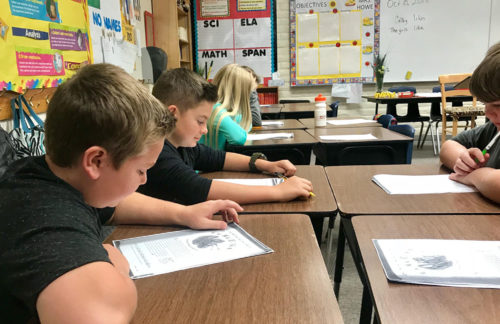
Cochise County schools are planning to implement a district-wide English and Spanish literacy curriculum through smartphones, tablets and computers. They believe this will ease low literacy rates in the county. If implemented, the app will be accessible to children in the district, and is hoped to increase literacy in pre-k to 3rd grade students. It all depends on wether the county receives a grant for the project.
“it is so important to put this technology into the hands of our students,” said Cochise County Superintendent Jacqui Clay. “Kids are always playing on their iPad’s and tablets. Why not have them learn something while doing so?”
The Cochise County School District is working with an organization called “Footsteps2Brilliance,” who would put the app into the hands of Cochise County students. According to the organization, their bilingual app can be downloaded onto any smart phone or computer located in the district’s jurisdiction. Their app features over 1,000 interactive books, songs and games that are designed to expand children’s vocabulary and enhance reading and critical thinking skills. According to the organization, only 12 grants will be made available in Arizona for qualified superintendents and their counties.
Studies published by Footsteps2Brilliance say students who used their app showed measureable improvements in vocabulary and comprehension in as little as 30 days.
The district is working on receiving a $5 million grant directly from Footsteps2Brilliance. The grant would be paid in the form of services, not cash. These services would include 5 years of renewable access to their app and professional development courses for teachers that would show them how to use the technology.
Fourth graders in Arizona read at one of the lowest levels in the country. Only two other states are worse, according to a 2017 report conducted by the National Assessment of Educational Progress. Students in Arizona scored an average score of 215 on reading assessments provided by NAEP. That’s six points below the national average.
Students who live in rural areas, like those found in Cochise County, often face additional challenges in development. Students experience limited access to materials and advance course work, high levels of poverty, and their schools often have difficulty recruiting teachers.
Clay says parents are the students first teachers and she would like to get this app into their hands, and into their children’s hands, as soon as possible.
Jill Castek Ph.D. and associate professor at the University of Arizona, has studied education psychology with a focus on literacy and technology.
“This idea of technology and literacy isn’t new,” Castek said, “but in today’s world where kids are used to this idea of multimodality, it really helps and supports their engagement with books.”
Castek supports all efforts to implement literacy technology into schools. She says literacy apps provide a large amount of reading material to families who might have limited resources.
Castek says literacy technology should not replace reading to your child, but it should be an enhancement. When a parent reads to a child, the parent is able to bond with them in a special and meaningful way. A literacy app provides an entirely different experience for readers. Children can focus on sentence construction, grammar, word knowledge and visualize the text.
Although literacy technology can be beneficial to students, study after study has shown that early reading with children helps them learn to speak, interact, bond with parents and read early themselves. A study conducted by the University of New York found that reading to children helps them curb behavioral problems like aggression and hyperactivity.
“There’s something really supportive about the parent child interaction, that can never be replaced by anything mechanical,” Castek said.
The Cochise County School district is holding an informational meeting today for parents and community leaders. A recording of the meeting is available at: https://www.facebook.com/CochiseCountySuperintendent/
Clara Lovell is a reporter for Arizona Sonoran News, a service from the School of Journalism with the University of Arizona. Contact her at [email protected]
Click here for a Word version of this story and high resolution photos.







